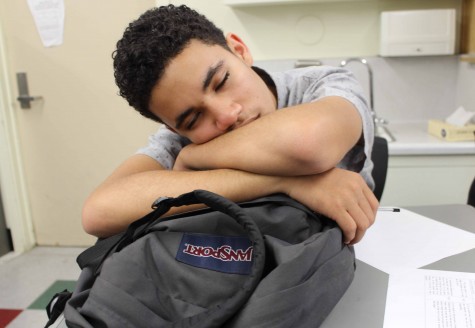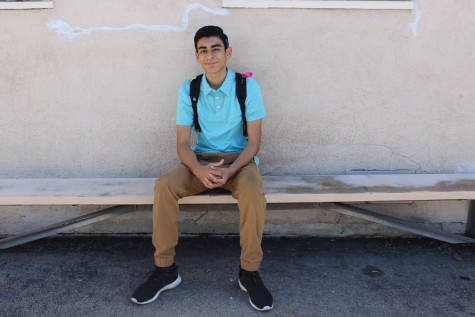The day to day struggle to get sleep
March 10, 2016
Junior Jamie Timsit gets an average of four to five hours of sleep per night, juggling cheer practice, projects and homework, time slips away.

Senior Chris Pina falls asleep during third period in Cynthia Barry’s English class. Students of Daniel Pearl Magnet High School battle the exhaustion daily due to lack of sleep.
“I feel like when I’m in school, I can’t really focus,” Timsit said. “It’s hard to focus in class because I’m just so tired. You’re held at such high expectations by your teachers and your parents… It’s hard to keep up and keep everyone proud of you.”
The average teenager is suggested to get nine to 10 hours of sleep per night. Lack of sleep can result in poor health and bad academic performance.
“Five to six hours. Sometimes I end up falling asleep in class,” sophomore Jade Ajileye said.
Causes of sleep deprivation can include a hormonal imbalance in teenagers such as a busy after school activities, and an over-active brain.
“School is getting very stressful,” Ajileye said. “You have these long schedules and a lot of homework when you come home.”
As reported in a U.S. News and World Report article “How Teachers, Parents Can Help Sleepy Teens Stay Awake At School,” two out of three teenagers don’t get the minimum required hours of sleep. Consequences that result from sleep deprivation can range from being moody to having a higher chance of developing mental health issues.
In an article published by the Huffington Post “5 Scary Health Effects Of Sleep Deprivation During The Teen Years,” there are five dangerous health issues that were discussed in relation to sleep deprivation which were problems with learning and behavior, mental health issues, substance abuse, relying on sleep/anxiety medication and risk of obesity.
Ways to prevent sleep deprivation include having a relaxing night routine, such as taking a warm bath right before bed. Performing activities that can arouse the brain such as playing computer games, studying or listening to loud music can disrupt a teenager’s sleeping pattern.
“Sometimes I’m just not tired, like I just don’t feel tired, I’m not able to go to sleep,” senior Jo Cortes said. “And other times it’s cause I’m on my electronics and stuff.”
Exposure to bright lights also make it more difficult for a teenager to fall asleep. Having the room kept dark can help a teenager fall asleep. Avoiding watching television can help prevent sleeplessness. Strenuous activities such as exercising a few hours before a teen falls asleep can also cause sleeplessness.
Parents can also take that can help stop teenage sleep deprivation. Allowing teens to sleep in on the weekend and to promote going to sleep early on Sunday can be helpful. Adding 30 extra minutes can make a difference.
Many teenagers find it difficult to go to sleep before 11 p.m. and a lot of schools tend to start before 8:30 a.m. This causes problems for many teens who find it hard to fall asleep before 11 p.m.
“I’d think it’d be easier (if school started later),” Ajileye said.
The U.S. News and World Report mentioned that a big way to help prevent sleep deprivation is having school start at a later time. This could help many teens who have a busy schedule.
“If we start school later that means school ends later,” freshman Steven Guzman said.


















